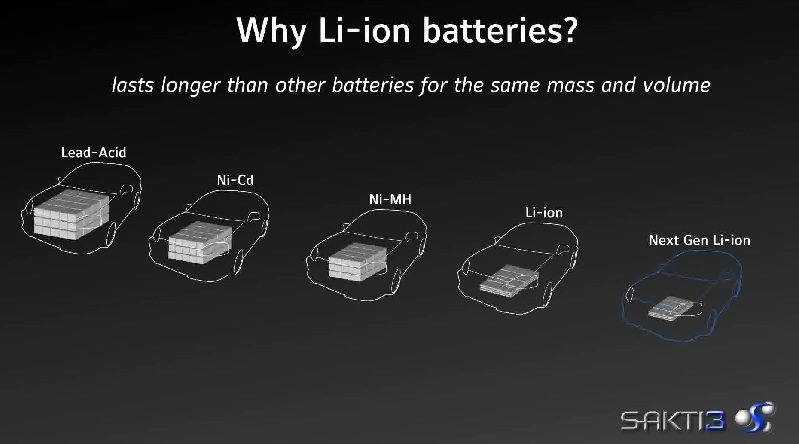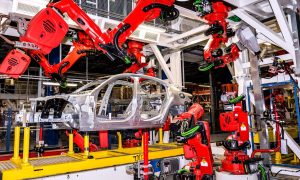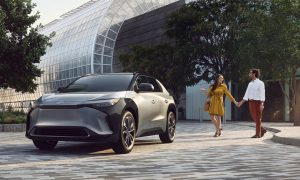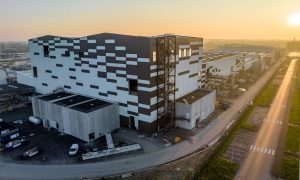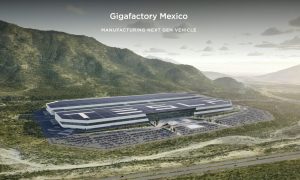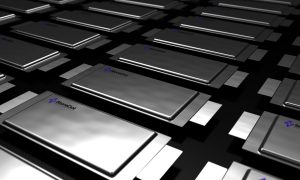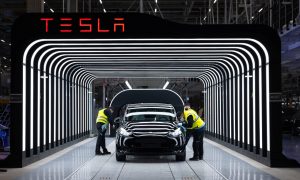News
Solid State Battery Technology, a Tesla Gigafactory Killer?
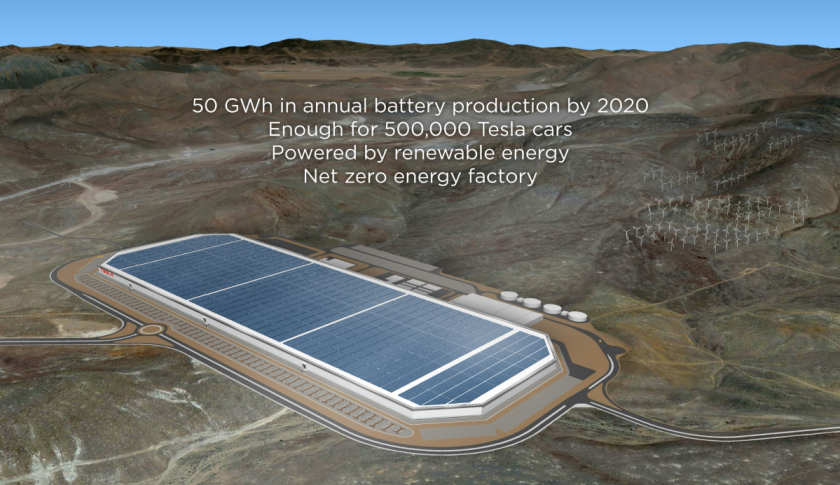
With 2014 coming to an end, automotive battery news has been trickling out and solid state battery technology appears, again.
In early December, Volkswagen acquired a small equity stake in Stanford-based QuantumScape and Daimler recently announced that its lithium production output will be larger in 2015 due to a new battery plant in Kamenz, Germany, said to be ready by mid-2015.
The VW news keeps the the solid state battery thread for 2014 going as scientists point to its reported improved energy density over lithium-ion technology. A solid state battery does not use a liquid electrolyte like a lithium battery does and, in theory, a solid electrolyte can hold more energy. Yes, please.
Getting rid of an electrolyte—no liquid—can also improve battery safety and reduce costs due to less cooling electronics and micro-controllers needed for pack management, thus reducing weight too, according to Harvard Business Review.
What about downsides to this technology? A solid-state battery has electrical contacts or, electrodes, that are applied to a solid electrolyte—similar to a thin-film solar panel process—and if there’s a lack of uniformity in this process, it can cause short circuits. However, this type of manufacturing application has been done in the thin-film solar area and these obstacles should be easy to overcome.
Earlier this year, Scientific American did a profile on Ann Arbor, Michigan-based Sakti3 and their push with solid-state battery technology and move closer to the “god” battery.
Ann Marie Sastry, co-founder and CEO of the company, said, “that the company’s prototype solid-state lithium battery cells have reached a record energy density of 1,143 Watt-hours per liter—more than double the energy density of today’s best lithium-ion batteries.”
However, as Elon Musk said in the most recent Tesla earnings call,
“Talk is super cheap, the battery industry has to have more BS in it than any industry I’ve ever encountered. It’s insane.”
So is this technology an immediate challenger to Tesla Motors’ Gigafactory strategy? Will this battery technology get ahead of Tesla, due its battery equipment investment at the Gigafactory being close to complete and, thus, no turning back?
No and the reason is battery development takes a lot of time and these recent statements by Sakti3 in the Scientific American article bear this out.
Sakti3 says it’s close to the end of lab work—custom prototype manufacturing line—but then the next step is on to small scale production and this could take a another year or two of testing before you hit mass production.
That rules out GM going with this type of battery for their mass-produced battery electric vehicle for 2016 or 2017. Plus, Sakti3 mentioned its first aim is small-scale electronics and smartphones.
More importantly, JB Straubel and Tesla Motors aren’t looking for the God battery for 2017. Everyone seems to be looking for this right chemistry to scale with at this point. Granted, these are big automakers that could scale quickly as long their company culture is rowing in the same direction.
Tesla has their battery composition set and plan to cut 30 percent or more of costs out of their current battery price, which stands anywhere from $260 to maybe $220 kWh. Take the high end and with the cost savings, the battery pack is at $185 kWh, approximately.
That’s just over $10,000 for a battery pack for a 55kWh battery pack—assumption 30% battery cost reduction translates to battery pack. Also, my assumption above is that a Gen 3 car will be smaller and could get 220 miles with a smaller battery pack.
The rub for me is that the roadmap is in place for Tesla Motors battery chemistry and this should get them to a mass-market electric vehicle, first. Maybe other automakers are close to a new chemistry, but automotive testing and applications take time.
In the end, I’m all for the god battery sooner rather than later but Tesla Motors just isn’t waiting for it.
News
These Tesla, X, and xAI engineers were just poached by OpenAI
The news is the latest in an ongoing feud between Elon Musk and the Sam Altman-run firm OpenAI.

OpenAI, the xAI competitor for which Elon Musk previously served as a boardmember and helped to co-found, has reportedly poached high-level engineers from Tesla, along with others from xAI, X, and still others.
On Tuesday, Wired reported that OpenAI hired four high-level engineers from Tesla, xAI, and X, as seen in an internal Slack message sent by co-founder Greg Brockman. The engineers include Tesla Vice President of Software Engineering David Lau, X and xAI’s head of infrastructure engineering Uday Ruddarraju, and fellow xAI infrastructure engineer Mike Dalton. The hiring spree also included Angela Fan, an AI researcher from Meta.
“We’re excited to welcome these new members to our scaling team,” said Hannah Wong, an OpenAI spokesperson. “Our approach is to continue building and bringing together world-class infrastructure, research, and product teams to accelerate our mission and deliver the benefits of AI to hundreds of millions of people.”
Lau has been in his position as Tesla’s VP of Software Engineering since 2017, after previously working for the company’s firmware, platforms, and system integration divisions.
“It has become incredibly clear to me that accelerating progress towards safe, well-aligned artificial general intelligence is the most rewarding mission I could imagine for the next chapter of my career,” Lau said in a statement to Wired.
🚨Optimistic projections point to xAI possibly attaining profitability by 2027, according to Bloomberg's sources.
If accurate, this would be quite a feat for xAI. OpenAI, its biggest rival, is still looking at 2029 as the year it could become cash flow positive.💰 https://t.co/pE5Z9daez8
— TESLARATI (@Teslarati) June 18, 2025
READ MORE ON OPENAI: Elon Musk’s OpenAI lawsuit clears hurdle as trial looms
At xAI, Ruddarraju and Dalton both played a large role in developing the Colossus supercomputer, which is comprised of over 200,000 GPUs. One of the major ongoing projects at OpenAI is the company’s Stargate program,
“Infrastructure is where research meets reality, and OpenAI has already demonstrated this successfully,” Ruddarraju told Wired in another statement. “Stargate, in particular, is an infrastructure moonshot that perfectly matches the ambitious, systems-level challenges I love taking on.”
Elon Musk is currently in the process of suing OpenAI for shifting toward a for-profit model, as well as for accepting an investment of billions of dollars from Microsoft. OpenAI retaliated with a counterlawsuit, in which it alleges that Musk is interfering with the company’s business and engaging in unfair competition practices.
Elon Musk confirms Grok 4 launch on July 9 with livestream event
News
SpaceX share sale expected to back $400 billion valuation
The new SpaceX valuation would represent yet another record-high as far as privately-held companies in the U.S. go.

A new report this week suggests that Elon Musk-led rocket company SpaceX is considering an insider share sale that would value the company at $400 billion.
SpaceX is set to launch a primary fundraising round and sell a small number of new shares to investors, according to the report from Bloomberg, which cited people familiar with the matter who asked to remain anonymous due to the information not yet being public. Additionally, the company would sell shares from employees and early investors in a follow-up round, while the primary round would determine the price for the secondary round.
The valuation would represent the largest in history from a privately-owned company in the U.S., surpassing SpaceX’s previous record of $350 billion after a share buyback in December. Rivaling company valuations include ByteDance, the parent company of TikTok, as well as OpenAI.
Bloomberg went on to say that a SpaceX representative didn’t respond to a request for comment at the time of publishing. The publication also notes that the details of such a deal could still change, especially depending on interest from the insider sellers and share buyers.
Axiom’s Ax-4 astronauts arriving to the ISS! https://t.co/WQtTODaYfj
— TESLARATI (@Teslarati) June 26, 2025
READ MORE ON SPACEX: SpaceX to decommission Dragon spacecraft in response to Pres. Trump war of words with Elon Musk
SpaceX’s valuation comes from a few different key factors, especially including the continued expansion of the company’s Starlink satellite internet company. According to the report, Starlink accounts for over half of the company’s yearly revenue. Meanwhile, the company produced its 10 millionth Starlink kit last month.
The company also continues to develop its Starship reusable rocket program, despite the company experiencing an explosion of the rocket on the test stand in Texas last month.
The company has also launched payloads for a number of companies and government contracts. In recent weeks, SpaceX launched Axiom’s Ax-4 mission, sending four astronauts to the International Space Station (ISS) for a 14-day stay to work on around 60 scientific experiments. The mission was launched using the SpaceX Falcon 9 rocket and a new Crew Dragon capsule, while the research is expected to span a range of fields including biology, material and physical sciences, and demonstrations of specialized technology.
News
Tesla Giga Texas continues to pile up with Cybercab castings
Tesla sure is gathering a lot of Cybercab components around the Giga Texas complex.

Tesla may be extremely tight-lipped about the new affordable models that it was expected to start producing in the first half of the year, but the company sure is gathering a lot of Cybercab castings around the Giga Texas complex. This is, at least, as per recent images taken of the facility.
Cybercab castings galore
As per longtime drone operator Joe Tegtmeyer, who has been chronicling the developments around the Giga Texas complex for several years now, the electric vehicle maker seems to be gathering hundreds of Cybercab castings around the factory.
Based on observations from industry watchers, the drone operator appears to have captured images of about 180 front and 180 rear Cybercab castings in his recent photos.
Considering the number of castings that were spotted around Giga Texas, it would appear that Tesla may indeed be preparing for the vehicle’s start of trial production sometime later this year. Interestingly enough, large numbers of Cybercab castings have been spotted around the Giga Texas complex in the past few months.
Cybercab production
The Cybercab is expected to be Tesla’s first vehicle that will adopt the company’s “unboxed” process. As per Tesla’s previous update letters, volume production of the Cybercab should start in 2026. So far, prototypes of the Cybercab have been spotted testing around Giga Texas, and expectations are high that the vehicle’s initial trial production should start this year.
With the start of Tesla’s dedicated Robotaxi service around Austin, it might only be a matter of time before the Cybercab starts being tested on public roads as well. When this happens, it would be very difficult to deny the fact that Tesla really does have a safe, working autonomous driving system, and it has the perfect vehicle for it, too.
-

 Elon Musk1 week ago
Elon Musk1 week agoTesla investors will be shocked by Jim Cramer’s latest assessment
-

 News2 weeks ago
News2 weeks agoTesla Robotaxi’s biggest challenge seems to be this one thing
-

 Elon Musk1 day ago
Elon Musk1 day agoElon Musk confirms Grok 4 launch on July 9 with livestream event
-

 News2 weeks ago
News2 weeks agoWatch the first true Tesla Robotaxi intervention by safety monitor
-

 News5 days ago
News5 days agoTesla Model 3 ranks as the safest new car in Europe for 2025, per Euro NCAP tests
-

 Elon Musk2 weeks ago
Elon Musk2 weeks agoA Tesla just delivered itself to a customer autonomously, Elon Musk confirms
-

 Elon Musk2 weeks ago
Elon Musk2 weeks agoElon Musk confirms Tesla Optimus V3 already uses Grok voice AI
-

 Elon Musk2 weeks ago
Elon Musk2 weeks agoxAI welcomes Memphis pollution results, environmental groups push back

